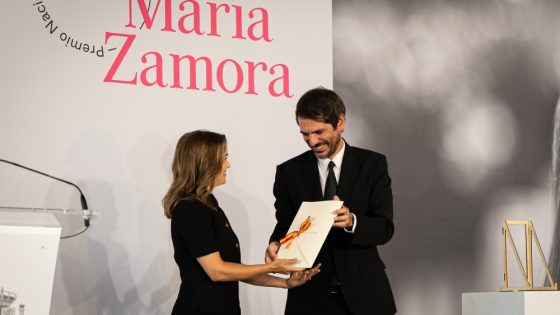Spanish producer Maria Zamora of Elástica Films, who has championed emerging and mostly female filmmakers through most of her 20-year career, received this year’s annual National Cinematography Award at the 72nd San Sebastian Festival on Saturday, Sept. 21.
On hand to introduce her were filmmakers Elías León Siminiani, Paula Ortiz and Spanish Culture Minister Ernest Urtasun.
Siminiani, who worked on two documentaries with Zamora in the span of 10 years, said: I’ve seen her career rise like a hot air balloon. After we stopped working together, she promptly snagged a Berlinale Golden Bear for ‘Alcarràs,’ a San Sebastian Golden Shell for ‘O Corno,’ a Goya for ‘Libertad’ and a Cannes Directors’ Fortnight award for ‘Creatura,’” he quipped.
“Indeed, in these uncertain times, we need a stabilizing force like Maria,” said Ortiz, a multi-Goya nominated filmmaker whose film “La Virgen Roja” (previously titled “Hildegart”), Elástica’s co-production with Prime Video, premieres on Sept. 22 in San Sebastian.
Before presenting her the prestigious honor, which includes a cash award of €30,000 ($33,500), Urtasun noted that Zamora had been “developing, over two decades, an extensive catalog of elective affinities. She has been able to create a very unique bond with the directors she has worked with, and that fruitful dialogue has gifted us with excellent feature films, recognized at major international festivals.”
He praised her for “constantly taking risks and prioritizing the social value of the cinematic act.” For this reason, he emphasized, “in our cinema, like in the films bearing María Zamora’s signature, we have an excellent guide to better understand the present.”
National Cinematography Award
Courtesy of San Sebastian Festival
In addition, Urtasun pointed out the growing presence of women in Spain’s film industry. Addressing Zamora, he said: “Through your work, you have helped ensure that the talent and efforts of many other women have reached where they naturally should have, breaking through age-old inequalities, silences, violence and discrimination that still persist but which we all have the responsibility to overcome. A responsibility we are very aware of at the Ministry of Culture.”
Speaking to Variety after the ceremony, Zamora indicated that she was far from ready to rest on her laurels. She has two films ready to shoot: Marta Matute’s “Yo no moriré de amor,” a co-production with Madrid-based Solita Films, to film in January in Madrid, and Laura Garcia Alonso’s “Corredora,” to shoot in Barcelona in April with Distinto Films.
Born in Valencia, Romero has been based in Madrid for some years with her producing partner/ husband Enrique Costa. “I hope to shoot more in Valencia,” she said, adding that she has collaborated with a number of Catalan filmmakers in recent years.
“Alcarràs” director Carla Simon just wrapped “Romería,” the third film in her trilogy that begun with “Summer 1993” in 2017, after which she will work on the flamenco musical she announced last year at San Sebastian.
“I made a conscious choice some 10 years ago to work with female filmmakers, many of them emerging,” Zamora said, adding that she must have backed at least ten debut features so far.
Meanwhile, she’s busy inviting everyone to drinks.
Source Agencies



